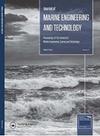Techno-economic feasibility assessment model for integrating hybrid renewable energy systems into power systems of existing ships: A case study of a patrol boat
IF 2.6
4区 工程技术
Q1 Engineering
Journal of Marine Engineering and Technology
Pub Date : 2022-06-13
DOI:10.1080/20464177.2022.2087272
引用次数: 1
Abstract
The shipping industry has set out to reduce CO2 emissions by 50% by 2050 compared to 2008, as op. cit. in the note by the International Maritime Organisation to the UNFCCC Talanoa Dialogue. In order to achieve this target, ship owners and operators are to consider replacing the conventional diesel generators and gas turbines with renewable energy and other cleaner power producing systems. In this paper, a techno-economic feasibility evaluation model for integrating hybrid renewable energy systems (HRES) into the power architecture of existing ships for greener and sustainable shipping is presented. For HRES to qualify as technically and economically feasible, a decision is made based on a ‘techno-economic measure’ which is estimated by combining space availability, load served and economic performance. The proposed model is applied to a patrol boat sailing along the Eastern Coast of Ghana with three different proposed HRES. The results from the applied case shows that the most technical and economically feasible HRES for the patrol boat that meets the key performance indicators and offers low GHG emission is a hybrid solar PV, wind turbine and diesel generator system. The results further shows that the proposed model is capable of assisting ship owners to integrate affordable and cleaner energy into the power architecture of ships.将混合可再生能源系统整合到现有船舶动力系统的技术经济可行性评估模型:以巡逻艇为例
国际海事组织在《联合国气候变化框架公约》塔拉诺阿对话的说明中指出,航运业已着手到2050年将二氧化碳排放量与2008年相比减少50%。为了实现这一目标,船东和运营商正在考虑用可再生能源和其他更清洁的发电系统取代传统的柴油发电机和燃气轮机。本文提出了将混合可再生能源系统(HRES)集成到现有船舶动力结构中以实现更绿色和可持续航运的技术经济可行性评估模型。为了使HRES在技术和经济上具有可行性,需要根据“技术经济措施”做出决定,该措施是通过综合空间可用性、服务负荷和经济性能来估计的。所提出的模型应用于沿加纳东海岸航行的一艘巡逻艇,该巡逻艇具有三种不同的拟议HRES。应用实例的结果表明,满足关键性能指标并提供低温室气体排放的巡逻艇HRES系统是太阳能光伏,风力涡轮机和柴油发电机混合系统。结果进一步表明,所提出的模型能够帮助船东将负担得起的清洁能源整合到船舶的动力结构中。
本文章由计算机程序翻译,如有差异,请以英文原文为准。
求助全文
约1分钟内获得全文
求助全文
来源期刊

Journal of Marine Engineering and Technology
工程技术-工程:海洋
CiteScore
5.20
自引率
0.00%
发文量
0
审稿时长
>12 weeks
期刊介绍:
The Journal of Marine Engineering and Technology will publish papers concerned with scientific and theoretical research applied to all aspects of marine engineering and technology in addition to issues associated with the application of technology in the marine environment. The areas of interest will include:
• Fuel technology and Combustion
• Power and Propulsion Systems
• Noise and vibration
• Offshore and Underwater Technology
• Computing, IT and communication
• Pumping and Pipeline Engineering
• Safety and Environmental Assessment
• Electrical and Electronic Systems and Machines
• Vessel Manoeuvring and Stabilisation
• Tribology and Power Transmission
• Dynamic modelling, System Simulation and Control
• Heat Transfer, Energy Conversion and Use
• Renewable Energy and Sustainability
• Materials and Corrosion
• Heat Engine Development
• Green Shipping
• Hydrography
• Subsea Operations
• Cargo Handling and Containment
• Pollution Reduction
• Navigation
• Vessel Management
• Decommissioning
• Salvage Procedures
• Legislation
• Ship and floating structure design
• Robotics Salvage Procedures
• Structural Integrity Cargo Handling and Containment
• Marine resource and acquisition
• Risk Analysis Robotics
• Maintenance and Inspection Planning Vessel Management
• Marine security
• Risk Analysis
• Legislation
• Underwater Vehicles
• Plant and Equipment
• Structural Integrity
• Installation and Repair
• Plant and Equipment
• Maintenance and Inspection Planning.
 求助内容:
求助内容: 应助结果提醒方式:
应助结果提醒方式:


